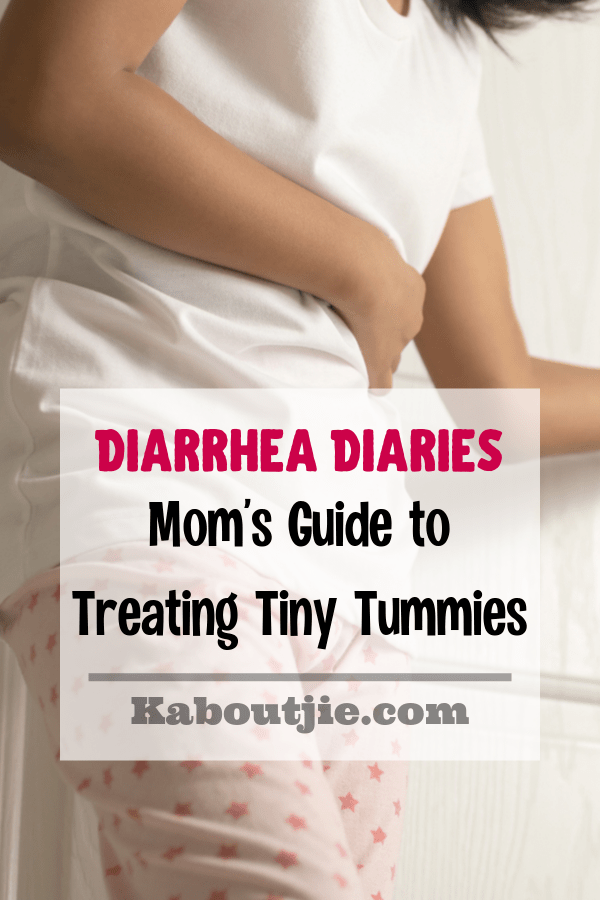Have you noticed a change in your child’s bowel movement? Has it become loose and watery? Has your baby or toddler been going to the toilet more often than usual?
If so, your child may have diarrhea.
Fortunately, there is safe and effective diarrhea medicine for kids available. As a mom, you can help with preventing diarrhea and taking care of your tiny tot’s tummy at home.

The ABCs of Diarrhea
Diarrhea is a common pediatric problem. It is normally short-lived and lasts for a few days. However, if left unattended, diarrhea can lead to dehydration and other complications.
According to Unicef data published in June 2018, diarrhea is a leading cause of death among children under the age of five around the world. That means there are 480,000 young children dying each year, mostly from South Asia and Sub-saharan Africa. That is why there is a global mission to push for more active prevention of diarrhea to protect children.
Diarrhea can be brought on by a number of causes, such as:
- Artificial sweeteners
- Bacteria
- Food poisoning
- Fructose
- Lactose intolerance
- Medications
- Other digestive orders
- Parasites
- Surgery
- Viruses
Watch Out for the Signs
Whether their children are still in their cots, attending nursery schools, or even already in intermediate schools, parents would always want them to be healthy.
If you are a mommy of a young child, it is understandable that you would worry more. Kids at a very young age would still need your help and guidance, especially when they get sick. Your tender loving care along with your wisdom and knowledge are key in ensuring that your baby or toddler is kept healthy.
When your young child has diarrhea, it is very important to be observant. You have to watch out for red flags so you will know if you need to call for immediate medical help.
Here are the common symptoms of diarrhea in babies and young children:
- Crying without tears
- Drowsy, unresponsive, or irritable
- Dry mouth and tongue
- Fever that is above 39° C or 102°F
- Less frequent urination than usual
- Not having a wet diaper for three or more hours
- Sunken appearance of the cheeks, eyes, or abdomen
Kids would usually complain about tummy cramps or pain followed by diarrhea for about three to four days. Here are examples of other possible symptoms:
- Dehydration
- Dizziness or nausea
- Lethargy
- Loss of appetite
- Vomiting
- Weight loss

Dehydration is a serious condition that may prove to be fatal if left untreated. There are also other signs that you should watch out for. It is best to call a doctor right away if you observe the following:
- Your child has diarrhea for more than three days
- Your child seems to be dehydrated
- Your baby is less than a month old and has diarrhea more than three times
- If fever is 100.4° F for infants and 105° F for babies over six months old
- If more than four diarrhea stools are passed in eight hours
- If not drinking enough fluids
- Your child has vomited more than twice or has vomited bloody green or yellow fluid
- Your child has bloody stools
- Your child has a rash
- Your child has not urinated for more than six hours (babies) or in 12 hours (young children)
Call emergency assistance right away if:
- Your child is too weary to stand up
- Your child is too dizzy or confused
Treatment at Home
If your pediatrician deems it safe for your child to stay home and recuperate, there are home care remedies that you can also try. These treatments for tiny tummies will be especially helpful in keeping them hydrated and on their way to recovery.
1. Diet adjustments
Breastfed infants should continue consuming breastmilk unless expressly ordered otherwise by your pediatrician. Children who are not dehydrated should also consume a regular healthy diet.
Those who are not dehydrated and can tolerate a regular diet may:
- Consume milk products, unless they are lactose-intolerant or have allergies to cow’s milk
- Eat a combination of complex carbohydrates (bread, potatoes, rice, wheat), fruits, lean meats, yogurt, and vegetables
- Avoid food and beverages that are high in fat and artificial sugar
- Eat food in smaller portions but in more frequent intervals to avoid vomiting
However, for children who are dehydrated, lost fluids must be replaced.
2. Oral rehydration therapy
Oral rehydration therapy has been developed as a less expensive and safer alternative to administering intravenous fluids for children who have moderate to acute diarrhea. Both UNICEF and the World Health Organization have recommended the use of an oral rehydration solution in the treatment of diarrhea since 2004.
An oral rehydration solution is a combination of electrolytes (chloride, potassium, and sodium) and glucose (sugar) that is given to those suffering from diarrhea. This is available in most pharmacies and are given to children to replace fluids that have been lost due to vomiting and diarrhea. It is important to consult a doctor to find out what oral rehydration solution is best for your child’s condition, as well as its correct dosage and other pertinent instructions.
3. Probiotics
Another way of helping to treat and prevent diarrhea is to give probiotics.
The human stomach has good and bad bacteria. If the balance is upset by factors such as diet changes, food disorders, intestinal infections or the like, diarrhea occurs. To keep the healthy balance of bacteria in the gut, certain probiotic strains can help alleviate diarrhea.
The Bacillus species, for example, is a type of probiotic strain that can work against diarrhea. It is a type of probiotic that can withstand conditions such as gut acids, heat, and the effects of antibiotics. It is best to consult your doctor regarding the type of probiotic medicine for diarrhea that is best for your child’s specific condition.
Happy tummy
A mom’s gut feeling is often correct. However, with diarrhea, it is still best to be more observant to make sure that it is addressed properly. More importantly, it is ideal to see your doctor if you notice the signs and symptoms stated above.
With proper protection and prevention or intervention plans, children can be kept healthy and have a happy tummy.
 Kaboutjie SA Mommy Blogs by Lynne Huysamen
Kaboutjie SA Mommy Blogs by Lynne Huysamen





The numbers are devastating, I never thought of diarrhea as dangerous as the statistics reveal. It’s sad to read that babies die from diarrhea. I am glad you shared this important information with us, I sure did learn a lot from this post. Thanks!
It can be very dangerous, scarily so Raina!
I once heard stories from my pastor that dehydration in especially babies can end tragically. Thank heavens Janelle didnt have any tummy troubles yet. And now that it’s summer it’s very important to help keep our children hydrated.
Dehydration can be deadly for babies Leana, it really is terrifying!
There honestly is nothing worse than when your little one is sick. We as mothers are not always sure when we can treat safely at home or when we need to see a doctor. Reall informative post. Thank you so much for always helping moms through this parenting journey
I totally agree with you, there is nothing worse than having a sick child – especially when they are very young and can’t tell you what is wrong! I always got into such a twist. It is a bit easier now that I can talk to my kids and know what is bothering them.
These are fantastic advice. Thank you for sharing. My daughter has a special love for tummy viruses so we often have these problems. And there are never enough advices.
I’m so sorry to hear that Karmen – we’ve had a good few tummy bugs here but I wouldn’t say more than other households thankfully!
Yup I use probiotics for my daughter now that she is older when I notice she has diarrhea and for myself too. When she was younger I would use good ole pedialyte.
Probiotics are brilliant Tina and we also love using Rehidrate which helps big time with hydration.
My daughter has never had diarrhea for that long. There were a few times I felt like she wasn’t drinking enough and force her to drink water if I could. It is good to know what to do if diarrhea last for a few days. My pediatrician also said to call if I am concerned better safe than sorry.
Always better safe than sorry Vicki! I totally agree with you there. You are so fortunate not to have any serious diarrhea problems with your girl. We have had a few nasty tummy bugs and it is not nice to deal with!
Hi Lynne,
This is such important info to know as a mom. Little ones can’t always tell us how they are feeling and rely on us to realize when something isn’t right. I didn’t realize it had been the leading cause of death in young children, that is so scary. Probiotics for kids is a great tip. They help keep the good bacteria plentiful in the tummy and the bad bacteria out. Great post!
-Heather
I was also surprised to hear about it being the leading cause of death in young children – scary stats right?
Diarrhea is scary. Not only does it completely sucker-punches a person, leaving us feeling weak and dehydrated, but also makes recovery quite difficult. For children, it is even worse. As Heather rightly said, kids cannot express exactly how they feel and it is easy to assume that the diarrhea is probably because of something they ate. So scary to read about symptoms in babies, Lynne. Thanks for all the valuable info about how to recognize that there’s something wrong and when to get medical help. It’s good that we can do so many things at home to ease the symptoms and recoup that energy.